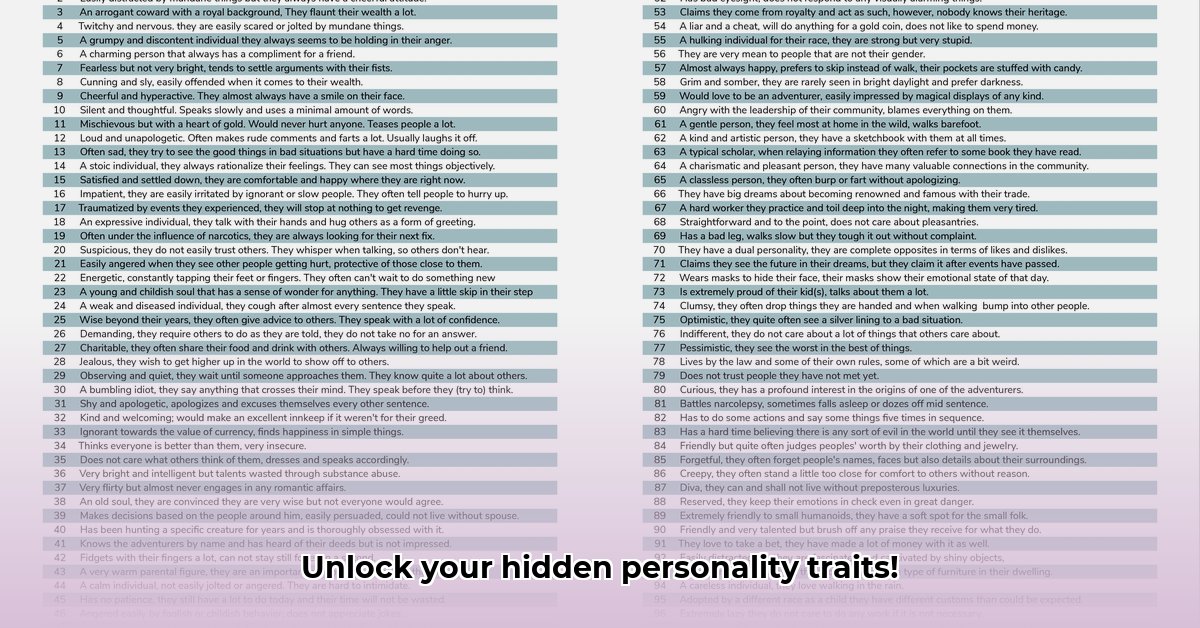
Hey there, maat! Ever wondered what makes you tick? What drives your decisions, shapes your relationships, and influences your success? Understanding your personality traits – your Karakter Eigenschappen Lijst – can unlock amazing insights about yourself and the world around you. This guide dives into the fascinating world of personality psychology, exploring the key models used to understand personality. We'll unpack the Big Five and HEXACO models, examine each trait, and provide real-life examples of how these traits show up in behaviour. This isn't just theory; we'll show you how to use this knowledge effectively in different areas of your life – from self-improvement and relationships to career success. Get ready for a journey of self-discovery and unlock your full potential.
Decoding Your Personality: Mapping Your Inner Landscape
Think of your personality as a complex and beautiful landscape. Psychologists have created different "maps" to navigate this landscape, with the Big Five and HEXACO models being two of the most popular. They're like different ways of looking at the same mountain range – each reveals unique features.
The Big Five model, a real crowd-pleaser among psychologists, focuses on five core personality traits: Openness, Conscientiousness, Extraversion, Agreeableness, and Neuroticism (often remembered by the acronym OCEAN). The HEXACO model adds another dimension: Honesty-Humility. Neither model is definitively "better"; they offer different perspectives on your personality. Which one resonates more with you? It’s a question worth considering.
Peeling Back the Layers: A Closer Look at the Big Five
Let's focus on the Big Five – a great place to start. Each trait isn't a simple "yes" or "no"; it's more like a sliding scale, where you can score high or low on each. How would you rate yourself?
Openness to Experience: Are you a curious explorer, always trying new things and welcoming new ideas? Or do you prefer the familiar and routine? High openness suggests a love of exploration; low openness might mean you value stability and predictability.
Conscientiousness: Are you super organised, always on schedule, a meticulous planner? Or are you more spontaneous and easy-going? High conscientiousness means you're reliable and detail-oriented; low conscientiousness might mean you're flexible and adaptable.
Extraversion: Are you the life of the party, energised by social interaction? Or do you recharge your batteries alone? Extraverts thrive in social settings, while introverts find energy in quieter moments. Is this something you really relate to?
Agreeableness: Are you a team player, always willing to compromise and cooperate? Or are you more independent and assertive? Highly agreeable people value harmony; less agreeable individuals may assert themselves more readily.
Neuroticism: Are you generally calm and even-tempered? Or do you experience mood swings, anxiety, or worry? Low neuroticism indicates emotional resilience; high neuroticism suggests greater emotional volatility.
Putting It All Together: Real-World Applications
So, what's the point of all this self-discovery? Knowing your personality traits is a powerful tool. It helps you understand your strengths, weaknesses, and reactions to situations. This self-awareness is key to personal and professional growth.
Think about teamwork: an extravert might excel at leading discussions, while an introvert might be a brilliant contributor through written work. A teacher who understands their students' personalities can tailor their teaching to connect better with each learner. Similarly, understanding your strengths can give you a massive advantage in the job market. Have you ever considered how your personality helps you excel in your job?
The Ups and Downs: Limitations and Ethical Considerations
Let's be realistic. Personality assessments aren't magic eight-balls. They provide valuable insights, but they don't tell the whole story. They're snapshots in time, and personality can change. Furthermore, cultural context significantly influences how these traits manifest. It's vital to consider these limitations when interpreting results.
Making the Most of Your Character Profile
Understanding your Karakter Eigenschappen Lijst is a journey of self-discovery. It's not about labeling yourself; it's about using this knowledge to grow. Focus on personal growth and continuous self-improvement. Use your understanding to navigate challenges more effectively and live a more fulfilling life. Keep exploring, keep learning, and keep growing!